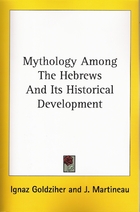 In a Singapore bookshop I recently picked up a reprint from an 1877 publication date and titled Mythology Among the Hebrews and Its Historical Development by Ignaz Goldzhier of Hungary (translated by Russell Martineau). And even more recently I was listening to a podcast by Robert M. Price in which he mentioned the same book. So I pulled it off my shelf and decided I’d see if I should get around to reading it at last.
In a Singapore bookshop I recently picked up a reprint from an 1877 publication date and titled Mythology Among the Hebrews and Its Historical Development by Ignaz Goldzhier of Hungary (translated by Russell Martineau). And even more recently I was listening to a podcast by Robert M. Price in which he mentioned the same book. So I pulled it off my shelf and decided I’d see if I should get around to reading it at last.
I have sometimes heard that so many of the characters from the Jewish Scriptures can be traced to mythological figures, but not knowing anything about this field of study I simply did not know what to make of the claims, so generally shelved them.
Today I looked up Elijah in the index and here is what I found:
Hairiness was a typically associated with the Sun, representing its rays of course.
The Sun punished the earth with drought.
The Sun also regenerates life.
The Sun is also symbolized by a pool or well of water.
The Sun descends into water before rising again to bring renewed life.
There are also sunny descriptions associated with David (stone throwing and ruddy complexion) and Samson (blinded at the end of his days).
It still looks like a Rorschach inkblot test to me. But then I see in the translator’s introduction a note about comparative mythology not being studied in England, etc. I don’t know this field. I don’t know what the current studies “in England” or any English speaking country are.
Still on the question shelf with this one.
If you enjoyed this post, please consider donating to Vridar. Thanks!

Yes, Cuchulain, Gawain, Heracles, and many others have probable sun-god traits used in their stories, but this is not the key to their meaning, which is rather thir role in story, and its meaning to th hearer. Its the particularities of the stories that matter.